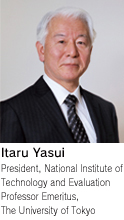
The year 2011 is likely to become a turning point in history. It seems to me that all sorts of values will change, not only in Japan but also around the world.
However will the great trend of globalization also change? Or will the trend of globalization not change, and instead will we find answers to the most fundamental questions, such as: What role should the economy serve for humankind? What message will Japan deliver? It seems that these questions will become immensely relevant.
What should we change? In Japan, a country built on manufacturing, an industry that requires making investment decisions from a long-term outlook, we have somehow done okay on American-style management policies and on principles like “short-term streamlining measures” and “continuous improvement.” But some clear weaknesses have emerged, and as a result, we failed to prepare for the full natural force of the Great East Japan Earthquake. Did the disaster not show businesses that such overwhelming powers must be accepted and addressed with a flexible mindset?
Returning to the topic at hand, the most important part in reading a CSR report is that the top management goals can be easily understood. This year's report expresses the JSR Group's intentions in four major areas: “activation toward growth,” a corporate mission that emphasizes “enduring goals,” the “E2 Initiative,” and a corporate culture based on “freedom and discipline.”
With regard to the environmental and energy-related E2 Initiative, I have provided my comments separately, but this initiative shows how serious JSR is in tackling challenges posed by the environment, a necessarily limiting condition for operating a business.
The message is that JSR will ascertain emerging needs and ambitiously launch new businesses based on an understanding that the environment has a strong community element and requires lower priced, higher quality products than most markets.
However, to go even further, I hope JSR is aware that to lead the environmental products field, one has to develop products that pioneer markets, that are radical, and that are a bit expensive but very satisfying to customers.
This is a personal opinion, but I believe the future key to popularizing environmental products is being able to make the right decisions along the three stages of a product's performance and price lifecycle: premium class, top class and standard class.
Looking at other environmental activities, biodiversity was the first to catch my attention. I could tell that biodiversity has been well integrated into JSR's business plans and that the Group is achieving quick results that go beyond “steady progress.”
Actually, in the Third Party Opinion for the CSR Report 2010 I wrote that I would watch closely how JSR addresses biodiversity. Business awareness generally improved as a result of the success of COP 10 in Nagoya, but the speed at which JSR acted was somewhat surprising.
In other areas, the visiting lectures program is fantastic. Teaching children to understand how modern, complex products are made is great for learning to become a responsible consumer, and therefore also a great investment. This program will stimulate an educational system that tends to focus entirely on test-taking.
Since the program covers junior high school students in addition to elementary students, why not choose a subject related to an interesting next-generation device?
And lastly, the fact that JSR Group began a CSR procurement initiative also deserves attention. I have a deep interest in what kind of results will be born through this initiative, which aims to transfer JSR's own corporate ethics and environmental standards to the other companies in its supply chains. Allow me to observe for a while.
The CSR Report 2011 (Japanese version) has been reviewed by the Responsible Care Verification Center and we have received their subsequent Independent Review Report. The Independent Review Report, which includes an explanation of its purpose, scope and procedures, indicated that no areas requiring material revisions to the Japanese version of the CSR Report 2011 were found.
Return to the top of the page ▲

